Key takeaways:
- Traditional assessments often emphasize memory recall, potentially overlooking diverse learning styles and student potential, particularly for those with dyslexia.
- Alternative assessment strategies, such as project-based evaluations and formative assessments, can provide a more accurate reflection of student understanding and creativity.
- Involving students in the assessment process promotes ownership and growth, fostering a more inclusive and empowering educational environment.
- The future of assessments may involve personalized, adaptive approaches that cater to individual strengths and learning styles, enhancing overall engagement and effectiveness.
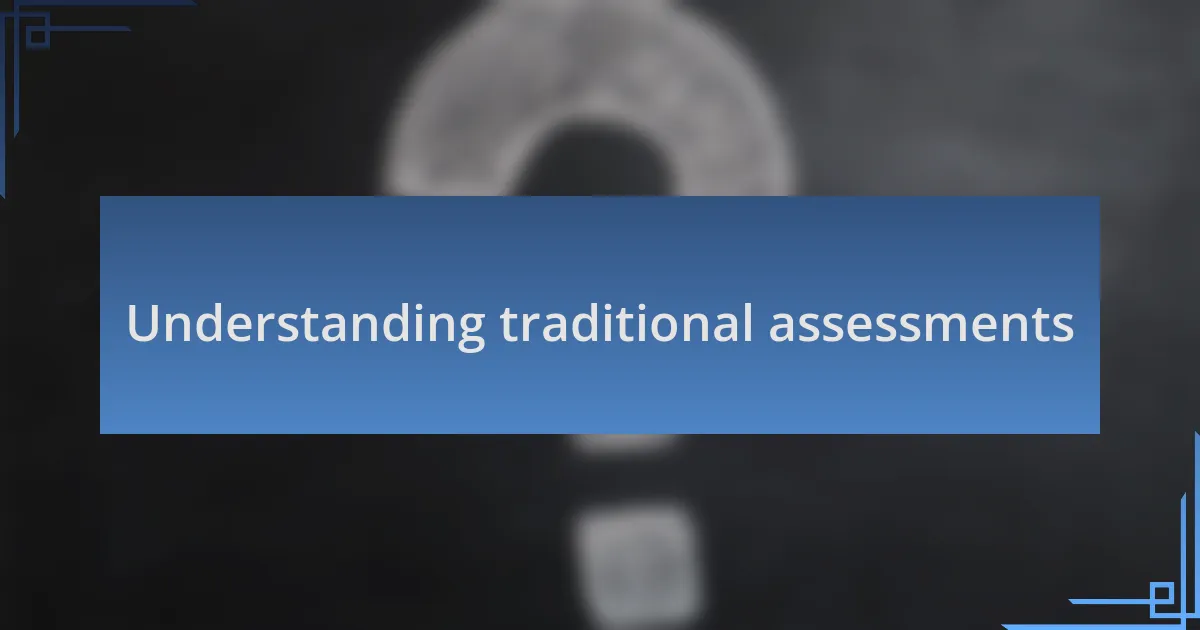
Understanding traditional assessments
Traditional assessments, often seen as the gold standard in education, primarily rely on standardized tests to measure student performance. I remember my own experience taking these tests—feeling the pressure of ticking boxes while my mind raced with anxiety instead of focusing on the material. How many students feel that this test anxiety overshadows their actual knowledge?
These assessments are designed to evaluate a student’s understanding through a narrow lens, primarily emphasizing memory recall and specific skills. While they can offer data on overall performance, I often wonder: do they truly capture a learner’s potential, especially for students with dyslexia? It’s crucial to consider if these methods can actually measure the diverse ways in which students learn and demonstrate their understanding.
Moreover, the one-size-fits-all approach of traditional assessments overlooks individual learning styles. For instance, I’ve seen students who thrive with hands-on learning struggle in a multiple-choice environment. Isn’t it time we challenged the effectiveness of these assessments and moved toward more holistic methods that recognize each student’s unique strengths?
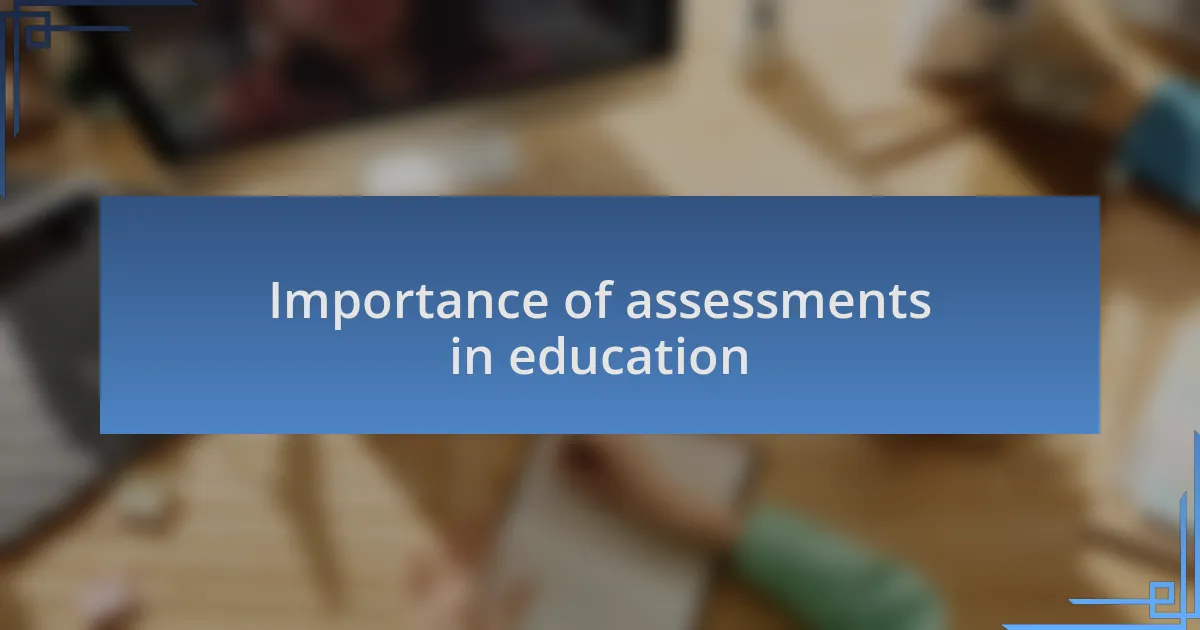
Importance of assessments in education
Assessments play a pivotal role in education by helping educators gauge student comprehension and progress. I recall a time when my own teacher used assessments not just as a grade, but as a conversation starter. Those moments were eye-opening, revealing not just what I knew, but also areas where I could improve. Isn’t it fascinating how a well-structured assessment can open the door to meaningful discussions that enhance learning?
However, the importance of assessments extends beyond simply measuring knowledge; they are foundational in identifying learning challenges early on. In my experience, recognizing my struggles with certain concepts through assessments prompted proactive support from my teachers. These early interventions can make a significant difference, especially for students with learning differences like dyslexia. How many students could benefit if their unique needs were identified sooner rather than later?
Finally, assessments are an essential tool for fostering student accountability and motivation. I’ve witnessed how regular assessments can empower students to take charge of their own learning journey. When students understand their strengths and weaknesses, they are more likely to engage actively. Isn’t it empowering for students to have the opportunity to reflect on their progress and set goals based on their assessment results?
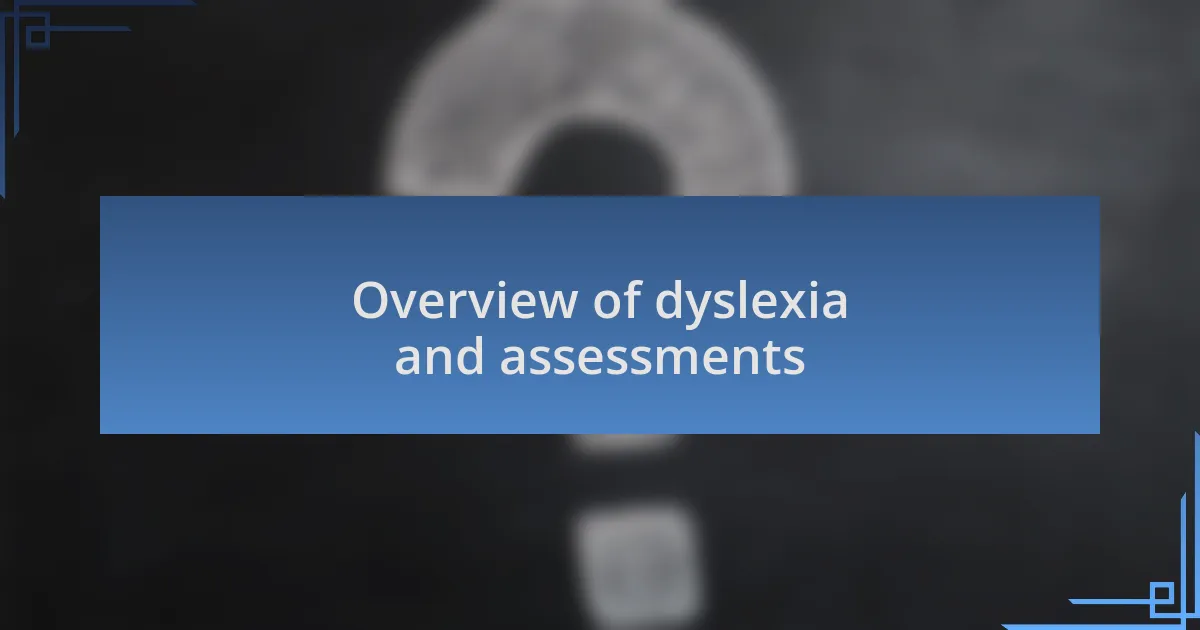
Overview of dyslexia and assessments
Dyslexia, a common learning difference, affects how individuals process language, leading to difficulties in reading, writing, and spelling. I vividly remember the frustration of grappling with letters that seemed to dance on the page, making assessments feel overwhelmingly intimidating. It’s crucial to understand that traditional assessments may not effectively capture the full spectrum of a dyslexic student’s abilities or struggles.
When it comes to assessments, one size definitely does not fit all. I have seen firsthand how standardized tests often fail to provide an accurate picture of a dyslexic student’s capabilities. These assessments typically prioritize speed and accuracy, placing undue pressure on students who require more time and alternative methods to demonstrate their knowledge. Have you ever felt sidelined by a format that just didn’t work for you? That’s an all-too-common experience for students with dyslexia.
This reality underscores the necessity for tailored assessments that honor diverse learning styles. In my journey, I found that more individualized approaches, such as oral presentations or project-based evaluations, allowed me to shine and express my understanding in ways that traditional testing could never accommodate. Shouldn’t every student have the opportunity to showcase their talents on their own terms? Embracing varied assessment strategies can lead to richer insights and a more supportive educational environment for dyslexic learners.
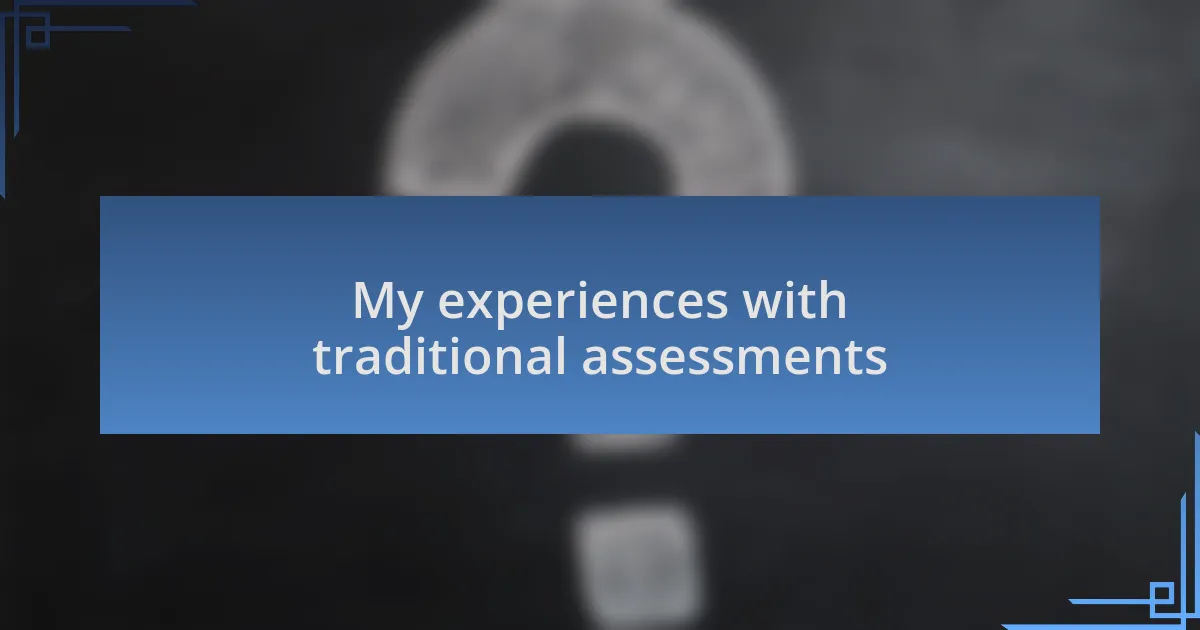
My experiences with traditional assessments
I often found myself dreading traditional assessments. During one particularly anxiety-filled reading test, I could feel my heart racing as I struggled to keep up while everyone else zipped through the questions. The ticking clock felt like an impending storm, and in that moment, my frustrations and feelings of inadequacy bubbled to the surface. Have you ever felt that suffocating pressure, where time seems more like an enemy than a tool?
In one instance, I remember receiving a low score on a spelling test that seemed to define my entire academic identity. It was a harsh reminder of how traditional assessments often fail to recognize the creative problem-solving skills that many of us with dyslexia possess. I began to wonder, why shouldn’t assessments reflect the full range of our strengths? The rigid structure of these tests overshadowed my unique learning style, leaving me craving a format that played to my strengths rather than my vulnerabilities.
When I finally encountered alternative assessments, it was like a breath of fresh air. I experienced a project-based assignment where I could demonstrate my understanding through artwork and presentations, and that experience sparked a sense of pride I had never felt before. It was liberating to express my knowledge without the restrictions of traditional testing formats. If only more educators recognized that there are countless ways to evaluate understanding beyond written tests, perhaps we could unlock the true potential in every student.
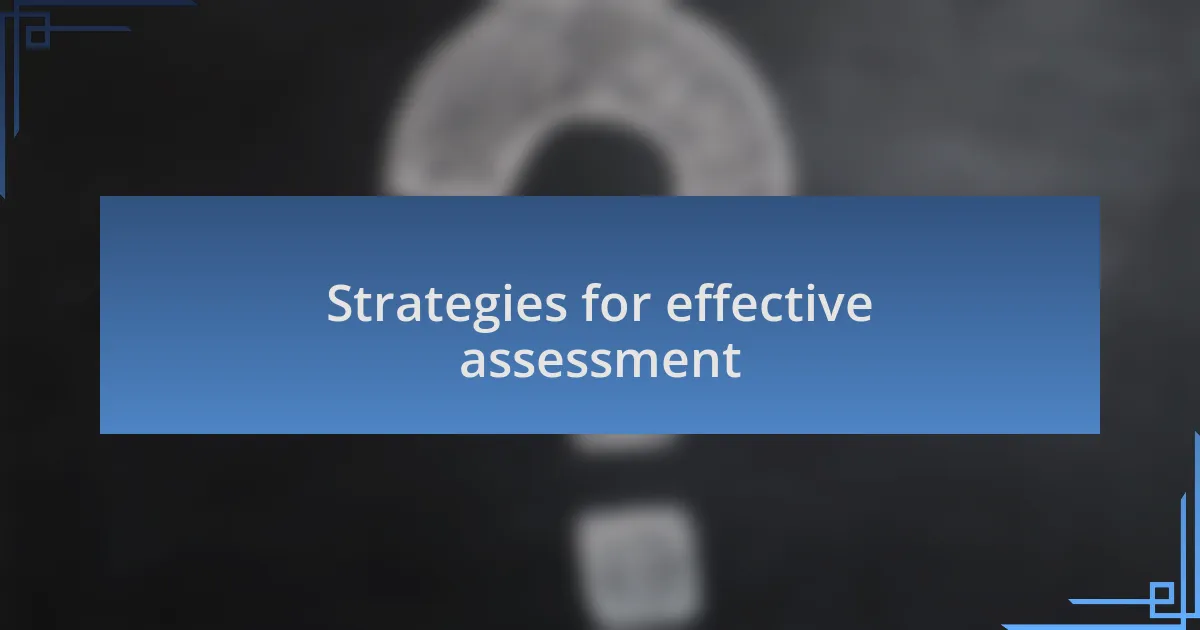
Strategies for effective assessment
Authentic assessments should embrace individual learning styles and provide diverse ways for students to showcase their understanding. I recall a time when a teacher encouraged us to create a video presentation instead of a written report. This approach not only made me feel more at ease but allowed my creativity to shine, illustrating my grasp of the subject in a way that traditional formats never did.
Incorporating formative assessments is another great strategy. These ongoing evaluations provide insights into a learner’s progress and understanding without the stress of a final score. I remember when my instructor used informal quizzes and group discussions, promoting a collaborative environment where I felt more comfortable sharing my thoughts without the fear of judgment.
It’s crucial to involve students in the assessment process, too. I once participated in a self-assessment where I reflected on my strengths and weaknesses while setting personal learning goals. This experience not only empowered me to take charge of my education but also fostered a growth mindset, reminding me that learning is a journey, not a race. Have you ever thought about how inclusive assessment practices could transform the educational landscape?
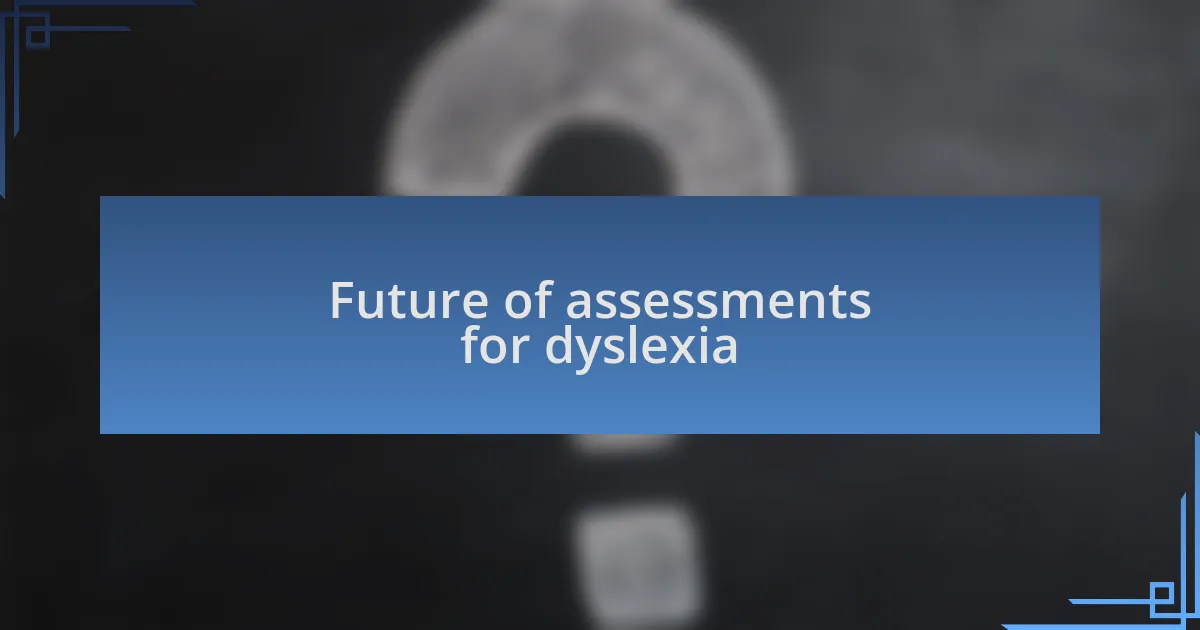
Future of assessments for dyslexia
The future of assessments for dyslexia is moving towards more personalized approaches that acknowledge the unique ways individuals process information. I once had a student who excelled in oral presentations but struggled with written assignments. This made me realize that assessments shouldn’t be a one-size-fits-all; instead, they should cater to strengths and preferences, allowing every learner to shine.
As technology continues to evolve, I can envision a shift towards dynamic, adaptive assessments that adjust in real-time to a student’s responses. I remember when I discovered an online platform that tailored questions based on my previous answers, making the experience feel more relevant and engaging. How much more effective could assessments be if they continually adapted to fit the learner’s needs?
Moreover, involving students in creating their assessments could be a game-changer. I recall a workshop where we brainstormed assessment ideas together, and I felt a sense of ownership over my learning. When students are encouraged to express how they prefer to demonstrate their knowledge, it fosters not only engagement but also a deeper understanding of their learning journey. Isn’t it empowering to envision a future where every assessment feels like a celebration of individual progress?